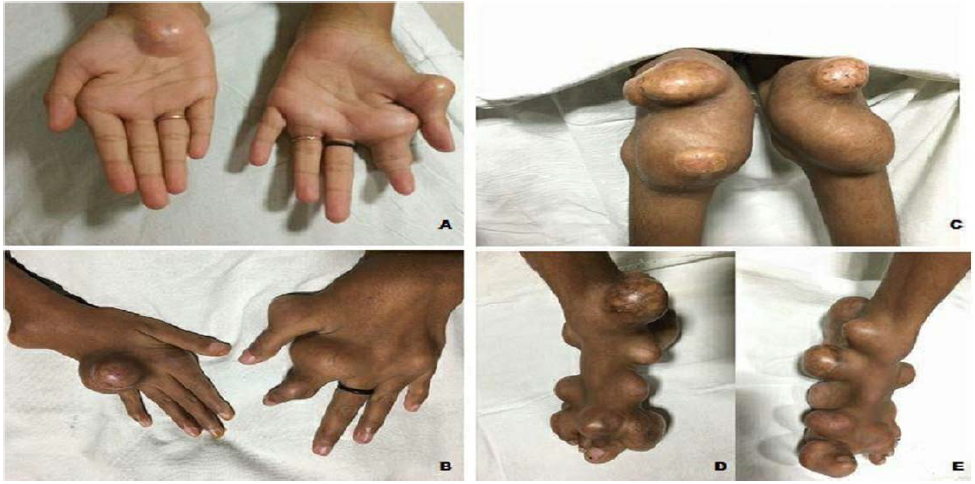Incapacitating Xanthomas
Article Information
Gunjan Gupta1, Vijay Kumar Diwana2, Kunal Mahajan3*, Rajesh Chauhan4, Saru Thakur5
1Department of Plastic Surgery, IGMC Shimla, HP, India
2Head of Department of Plastic Surgery, IGMC Shimla, HP, India
3Department of Cardiology, IGMC, Shimla, HP, India
4Department of Plastic Surgery, IGMC, Shimla, HP, India
5Department of Dermatology, IGMC, Shimla, HP, India
*Corresponding Author: Kunal Mahajan, Department of Cardiology, IGMC, Shimla, HP, India
Received: 3 March 2017; Accepted: 09 March 2017; Published: 09 March 2017
View / Download Pdf Share at FacebookAbstract
A 15 years old female presented with multiple gradually enlarging nodules over the limbs and buttock region for past 8 years. Patient was mainly concerned about swellings over her feet and hands, as these were so incapacitating that she was unable to do routine tasks like wearing shoes and writing. Her father and younger sibling had similar nodules but much smaller in size. Systemic examination was normal. Local examination revealed multiple yellowish brown, smooth surfaced painless xanthomas of varying size over gluteal region, bilateral knees,feet and hands. (Figure 1) Xanthomas between thumb and index finger, a pathognomic finding in homozygous familial hypercholesterolemia(HoFH) was also seen. (Figure 1a and 1b) Blood investigations revealed deranged lipid profile (total cholesterol of 710 mg/dl, low density lipoprotein (LDL) cholesterol of 620 mg/dl, high density lipoprotein cholesterol of 35 mg/dl and triglycerides of 115 mg /dl). Rest of the blood investigations were normal. X-ray bilateral knees, feet and hands revealed soft tissue swellings corresponding to soft tissue swellings.Typical clinical manifestations at a young age, lipidogram and positive family history in two first degree relatives confirmed the diagnosis of HoFH.[1] Genetic testing facility was not available Fortunately patient did not have any atherosclerotic or cardiac manifestations. She was started on high dose rosuvastatin and ezitimibe therapy.
Keywords
Xanthomas; Atherosclerosis
Article Details
Conclusion
HoFH is a rare disease, occurring in 1:1,000,000 individuals.It results from mutation in the LDL receptor genes and results in premature atherosclerosis and xanthomas at a very young age.[2] Such excessive and incapacitating presentation of xanthomatosis adds clinical intriguity to the present case.
References
- Goldberg AC, Hopkins PN, Toth PP, et al. Familial hypercholesterolemia: screening, diagnosis and management of pediatric and adult patients: clinical guidance from the National Lipid Association Expert Panel on Familial Hypercholesterolemia. J Clin Lipidol 5 (2011): S1-S8.
- Kolansky DM, Cuchel M, Clark BJ, et al. Longitudinal evaluation and assessment of cardiovascular disease in patients with homozygous familial hypercholesterolemia. Am J Cardiol 102 (2008): 1438-1443

